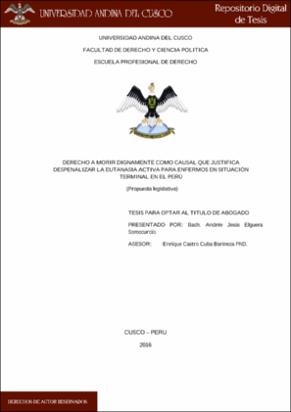| dc.contributor.advisor | Castro Cuba Barineza, Isaac Enrique | |
| dc.contributor.author | Elguera Somocurcio, Andrée Jesús | |
| dc.date.accessioned | 2016-10-17T16:58:10Z | |
| dc.date.accessioned | 2016-10-17T16:58:13Z | |
| dc.date.available | 2016-10-17T16:58:10Z | |
| dc.date.available | 2016-10-17T16:58:13Z | |
| dc.date.issued | 2016-07-20 | |
| dc.identifier.uri | https://hdl.handle.net/20.500.12557/355 | |
| dc.description.abstract | El derecho a la eutanasia activa es el principal actor en esta tesis. Vamos a analizar todo el contexto donde éste derecho alcanza su mejor desenvolvimiento.
Entonces, observamos que la eutanasia significa tan simple como es la “buena muerte” que debe alcanzar toda persona que padece una enfermedad terminal que le genera sufrimientos extremos, que lo llevan a decidir por la finalización de su vida ejercida por un tercero que vendrá a ser el médico que lo atiende, en el mejor de los casos que ocurriera eso.
Entonces la eutanasia activa exige que exista una manifestación expresa y clara de la voluntad del paciente terminal pues sólo con su consentimiento se puede dar paso a la práctica de la muerte por medio del médico. Así, estaríamos actuando de acuerdo a lo que el Derecho permite. No así por ejemplo en el caso más cercano que es el de la eutanasia pasiva, donde se presume la voluntad de un paciente con enfermedad terminal que no puede manifestar directamente su voluntad, por ejemplo en el caso de alguien que se encuentra en estado vegetativo.
Todo esto se encuentra fundamentado principalmente en que existe innatamente en todos nosotros el derecho a la dignidad humana, que protege ante todo el natural y normal accionar y desenvolverse de las personas en el mundo. Por eso, cualquier alteración, como es aquel sufrimiento extremo por la enfermedad terminal degenera ese normal accionar de una persona, por lo cual ésta, utilizando su derecho a la libertad (de expresar su voluntad) decide terminar con otro derecho fundamental: el derecho a la vida. Colisionan así tres derechos fundamentales, la libertad, la vida y la dignidad. | es_PE |
| dc.description.abstract | The right to active euthanasia is the main actor in this thesis. We will analyze all the right context where it reaches its best development.
So we see that euthanasia means as simple as “good death“ which should reach every person with a terminal disease that causes extreme suffering, that lead him to decide by the end of his life exercised by a third party who will come to be the attending physician, the best that to happen.
Then active euthanasia requires that there be an explicit and clear expression of the will of the terminal for only with patient consent can give way to the practice of death by the doctor. So, we would be acting according to what the law allows. Not so for example in the closest case is that of passive euthanasia, where the will of a patient with terminal disease that can not directly express their will, for example in the case of someone who is in a vegetative state is presumed.
All this is based mainly exists innately in all of us the right to human dignity, which protects against all the natural and normal action and function of people in the world. Therefore, any alteration, as is that extreme suffering for the terminally ill degenerates that the normal actions of a person, so, utilizing their right to freedom (to express their will) decides to end another fundamental right: the right to life. and they collide three fundamental rights, freedom, life and dignity. | en_US |
| dc.description.uri | Tesis | es_PE |
| dc.format | application/pdf | es_PE |
| dc.language.iso | spa | es_PE |
| dc.publisher | Universidad Andina del Cusco | es_PE |
| dc.rights | info:eu-repo/semantics/openAccess | es_PE |
| dc.rights.uri | https://creativecommons.org/licenses/by-nc-nd/2.5/pe/ | es_PE |
| dc.source | Universidad Andina del Cusco | es_PE |
| dc.source | Repositorio Institucional - UAC | es_PE |
| dc.subject | Eutanasia | es_PE |
| dc.subject | Enfermos | es_PE |
| dc.subject | Morir | es_PE |
| dc.subject | Despenalizaciòn | es_PE |
| dc.title | Derecho a morir dignamente como causal que justifica despenalizar la eutanasia activa para enfermos en situación terminal en el Perú (Propuesta Legislativa). | es_PE |
| dc.type | info:eu-repo/semantics/bachelorThesis | es_PE |
| thesis.degree.name | Abogado | es_PE |
| thesis.degree.grantor | Universidad Andina del Cusco. Facultad de Derecho y Ciencia Política | es_PE |
| thesis.degree.level | Titulo Profesional | es_PE |
| thesis.degree.discipline | Derecho | es_PE |


